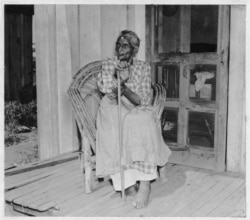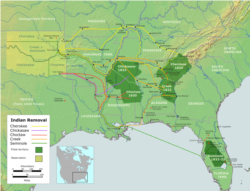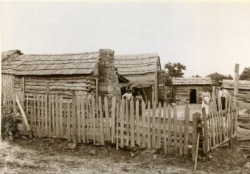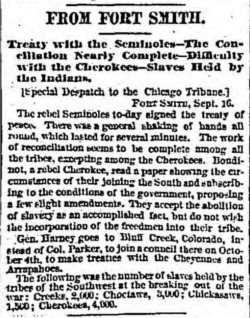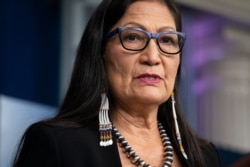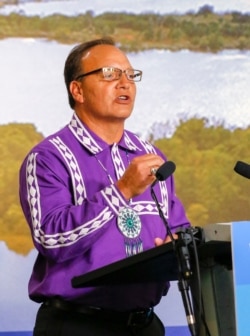The powerful chair of the U.S. House Committee on Financial Services is bringing new attention to a longstanding controversy over the rights of the Freedmen, the lineal descendants of African American slaves who in the early 1800s accompanied their Native American owners along the Trail of Tears to present-day Oklahoma.
On July 27, members of the Housing, Community Development, and Insurance Subcommittee met to discuss reauthorization of the Native American Housing Assistance and Self Determination Act (NAHASDA), a 1996 law that grants federally recognized tribal governments housing and community development funds, and ways to ensure that Freedmen have access.
Democratic Congresswoman Maxine Waters, who is also a senior member of the Congressional Black Caucus, has submitted a draft bill which would require the government to withhold housing funds from any tribe violating 19th century treaties that gave Freedmen tribal citizenship and associated rights.
The U.S. Department of Housing and Urban Development is slated to offer the Cherokee, Chickasaw, Choctaw, Muscogee Creek and Seminole nations more than $62 million in NAHASDA funds this year.
‘Livestock’
The story of the Freedmen began in the earliest years of American independence.
Wave after wave of new settlers encroached on the so-called Five Tribes – the Cherokee, Chickasaw, Choctaw, Creek and Seminole, who, whether by pressure or outright deception, signed a series of treaties that chipped away at their land holdings in the southeastern states.
In his "A People’s History of the United States," historian Howard Zinn suggests that by the early 1800s, tribes found themselves surrounded by white settlers, and integrating into white society seemed the only path to winning the “good will of Americans.”
The tribes gradually assimilated into the southern plantation economy, raising cotton and producing cloth; some tribe members followed the example of white plantation owners and used African slave labor.
In the 1830s, the government forced the Five Tribes along the brutal, 1,000-mile Trail of Tears into Indian Territory (present-day Oklahoma); they brought their slaves with them.
“Black people on the Trail of Tears were like livestock,” said Eli Grayson, a citizen of the Muscogee (Creek) Nation descended from both slaves and slave owners. “They were there for one purpose, and that was to help move these people – and rebuild and re-establish the tribes once they got into Oklahoma.”
At the outbreak of the American Civil War in 1861, the tribes signed treaties with the South that read, “… the institution of slavery in the said nation is legal and has existed from time immemorial.”
“These tribes allied with the Confederate states – the same states that had taken their homelands originally – because those states promised they would have the sovereign right to keep their slaves,” Grayson said.
That alliance nullified all previous treaties with the federal government. At war’s end, in order to reinstate their relationship with the U.S., they were forced in 1866 to sign treaties agreeing to abolish slavery and give the Freedmen “all the rights and privileges of native citizens.”
The treaties, explained Grayson, don’t obligate the tribes alone:
“The federal government, as a signer of the treaty, also has the obligation to treat these people the same as Native citizens, whether they're citizens of those working or not,” he said.
The Choctaw and Chickasaw Nations signed jointly and gave the Freedmen citizenship, but in 1979 and 1983 respectively, rewrote their constitutions to limit citizenship to Indians “by blood,” thereby disenrolling thousands of Freedmen descendants.
The Seminole and Chickasaw Nations also gave their former slaves citizenship but have denied them most rights and benefits of other tribe members.
The Cherokee Nation gave Freedmen citizenship in July 1866, but in 2007, like the Muscogee and Choctaw, rewrote their constitution to restrict citizenship to Indians “by blood.”
After a long political and legal battle, a U.S. District Court in 2017 ruled that the Freedmen should enjoy all the rights of tribal membership; in February 2021, the Cherokee Nation Supreme Court ruled to remove the phrase “by blood” from the nation’s constitution; Secretary of the Interior Deb Haaland approved the new constitution in mid-May of 2021, expressing hope that the other four tribes would also meet their “moral and legal obligations to the Freedmen.”
The four tribes have remained silent on the issue in recent weeks but have previously expressed opposition to Waters’ efforts to link Freedmen rights to housing appropriations.
In June 2020, Choctaw Chief Gary Batton wrote a letter to House Speaker Nancy Pelosi, expressing his objection to federal efforts to “subjugate the sovereignty, self-governance and self-determination” of his tribe.
“The Freedman issue is a problem caused by the United States, not the Choctaw Nation,” he wrote. “Congress should not be permitted to abuse its power by forcing the Choctaw Nation to fix America's longstanding problems of systemic racism rooted in America's enslavement of African Americans."
In late May, however, following Haaland’s statement, he and Muscogee (Creek) Nation Chief David Hill indicated they were willing to open the controversy up for discussion.
“Our stories, Native American, African American, are inextricably linked with European Americans and with one another,” Batton wrote in an open letter to tribe members. “Let us not be bound by an artificial construct of those who sought to take our lands, culture and dignity hundreds of years ago.”
The Muscogee (Creek) Nation is still celebrating a recent Supreme Court victory in a case in which they cited 19th century legislation to win criminal jurisdiction across most of Eastern Oklahoma.
Muscogee chief David Hill did not respond to VOA’s request for comment.
Legacy of Jim Crow
Marilynn Vann is a descendant of Cherokee Freedmen and Cherokee Indians by blood. She believes the controversy is rooted in racism, which has a long history in Oklahoma.
“In its early years of Indian territory and in the first years of statehood, Oklahoma became populated by white people coming from the Deep South, and they wanted to put black people in their place,” said Marilyn Vann, president of the Descendants of Freedmen of the Five Civilized Tribes Association.
“After Oklahoma became a state, the first law it passed was Senate Bill One,” she said.
Approved on December 18, 1907, only four weeks after Oklahoma was admitted into the Union, the so-called coach law ordered separate rail cars and waiting room facilities for the state’s white and black populations.
Between 1890 and 1957, Oklahoma passed 18 “Jim Crow” laws enforcing racial segregation, using terror tactics – including lynchings – to enforce them.
Denied services
Freedmen descendants in four out of the Five Tribes are not permitted to vote or run for office in tribal elections and are denied federal housing, health and education benefits.
In March, Buzzfeed News reported that an Indian Health Service health clinic refused to give several Seminole Freedmen COVID-19 benefits.
“Freedmen descendants should share in all benefits and programs offered to the citizens of the Muscogee Nation,” said Rhonda Grayson, a member of the Muscogee Creek Indian Freedmen Band (MCIFB) who has worked closely with Rep. Waters and other members of Congress on this issue.
Waters participated in a virtual town hall meeting organized by MCIFB in late March, giving Freedmen from all Five Tribes an opportunity to weigh in on the debate.
After hearing their complaints, Waters issued a stern message for the four tribes:
"If you want the government to recognize the treaties between you and the government, then you have to recognize the treaty that covers the descendants of the enslaved,” she said. “What's fair is fair.”
EDITOR'S NOTE: This story originally mistakenly stated that the Choctaw and Muscogee (Creek) Nations signed a joint treaty in 1866. The story has been corrected to reflect that the Choctaw and Chickasaw Nations signed that treaty together.





